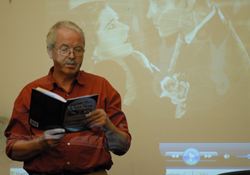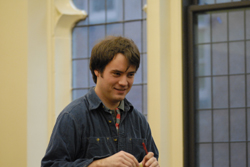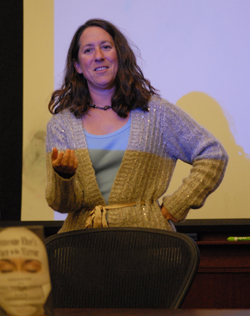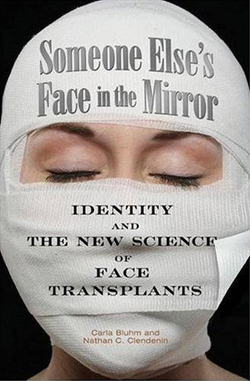Identity under the Knife
The authors of a book on facial transplantation explore the procedure's implications for identity
Who would you be if suddenly your face was no longer the one you were born with? And what would it be like to look in the mirror and see a face that’s not the one you’ve always had?
TC alumna Carla Bluhm (M.A., Ed.M. and Ph.D.) and Nathan Clendenin, a TC doctoral student in Interdisciplinary Studies, addressed these and other provocative questions during a book talk in Gottesman Library in October. The two are co-authors of Someone Else’s Face in the Mirror: Identity and the New Science of Face Transplants (Praeger, 2009), which explores these remarkable new surgeries and their wide-ranging implications for considerations of personal identity.
Bluhm, a developmental psychologist and faculty member at the College of Coastal Georgia , took courses during her TC student days with John Broughton, co-founder of the College’s Film and Education Research Academy
But the authors believe the topic is about to enter another realm. “Face transplantation is something that everyone is going to have to come to terms with at some point,” Bluhm said.
The procedure is still experimental, with only a handful of reported operations performed since Isabelle Dinoire received the world’s first only four years ago in France U.S.
“In a time when the subject of human identity is often discussed with little comprehension, face transplant surgery is a procedure that merits serious attention from the public,” said Clendenin, who studied with Bluhm at Allegheny College
When Bluhm learned this summer that Oprah was planning to interview Connie Culp , America
Bluhm has since forged a dialogue on the subject with her own students. In her course on adolescent psychology, she uses the idea of facial transplantation as a pedagogical device to stimulate new thinking by those studying middle school education. What it would be like, she asks her students to wear another person’s face—and how might that be akin to the dramatic facial changes many adolescents undergo during the tumultuous years of puberty?
As a student at TC, Bluhm herself was “an extraordinary student who always marched to the beat of her own drum,” according to Broughton, who moderated the book talk. Returning the compliment, Bluhm praised her former professor “as the single most important force” during her time at TC, a mentor who taught her how to conduct scholarship with depth, diversity and intellectual curiosity.
The result is a book that—like the surgery it contemplates—merits a closer look.
Published Monday, Jan. 11, 2010



